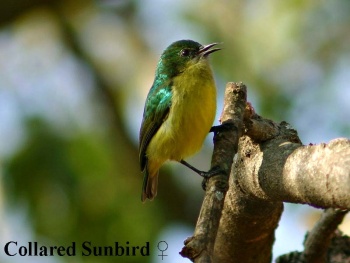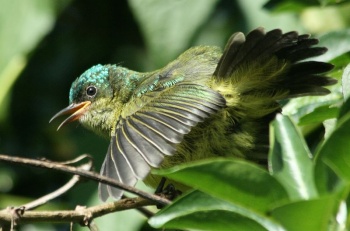m (→External Links) |
|||
| (7 intermediate revisions by 3 users not shown) | |||
| Line 1: | Line 1: | ||
| − | [[ | + | [[Image:Collared_Sunbird.jpg|thumb|450px|right|Male<br />Photo © by {{user|rudydbn|rudydbn}} <br />Durban, [[South Africa]], June 2006]] |
;[[:Category:Hedydipna|Hedydipna]] collaris | ;[[:Category:Hedydipna|Hedydipna]] collaris | ||
''Anthreptes collaris'' | ''Anthreptes collaris'' | ||
| − | |||
==Identification== | ==Identification== | ||
| − | Length 10- | + | Length 10-10.5 cm (4-4¼ in), mass 7-9 g<br /> |
| + | '''Male''': Upperparts bright metallic green, tail darker. Flight feathers dark brown edged green. Chin and throat bright metallic green, separated from the bright yellow breast and belly by a blue-purple band. Pectoral tufts yellow. Bill short and slightly decurved ([[Dictionary_A-C#C|culmen]] 14 mm).<br /> | ||
| + | '''Female''': Similar to the male, except that the entire underparts are yellow. | ||
| + | ====Similar Species==== | ||
| + | The [[Variable Sunbird]] is similar, but is larger with a longer bill. The male [[Variable Sunbird]] has a broader breast band and orange or red pectoral tufts, and the female is greyish brown above. | ||
| + | [[Image:12368Collared Sunbird AF.jpg|thumb|350px|right|Female<br />Photo © by {{user|rudydbn|rudydbn}}<br />Illovo Glen, Durban, [[South Africa]], June 2004]] | ||
| + | ==Distribution== | ||
| + | Sub-Saharan [[Africa]]<br /> | ||
| + | '''Western Africa''': [[Senegambia]], [[Senegal]], [[The Gambia]], [[Guinea-Bissau]], [[Guinea]], [[Mali]], [[Sierra Leone]], [[Liberia]], [[Ivory Coast]], [[Burkina Faso]], [[Ghana]], [[Togo]], [[Nigeria]], [[Chad]], [[Cameroon]], [[Central African Republic]], [[Equatorial Guinea]], [[Gabon]], [[Democratic Republic of Congo]] and [[Angola]]<br /> | ||
| + | '''Eastern Africa''': [[Sudan]], [[Ethiopia]], [[Somalia]], [[Kenya]], [[Uganda]], [[Rwanda]], [[Burundi]], [[Tanzania]], [[Zambia]], [[Mozambique]] and [[Malawi]]<br /> | ||
| + | '''Southern Africa''': [[Namibia]], [[Botswana]], [[Zimbabwe]], [[South Africa]], [[KwaZulu-Natal]] and [[eSwatini]]<br /> | ||
| + | '''African Islands''': Gulf of Guinea Islands, [[Bioko]] (Fernando Po) | ||
| − | |||
| − | |||
| − | |||
==Taxonomy== | ==Taxonomy== | ||
| − | This is one of the four Sunbirds that have recently been moved to the genus ''Hedydipna'' from the genus ''Anthreptes''. | + | This is one of the four Sunbirds that have recently been moved to the genus ''Hedydipna'' from the genus ''[[:Category:Anthreptes|Anthreptes]]''. |
| − | + | ====Subspecies==== | |
| − | Nine subspecies are recognised, based on variation in plumage coloration. | + | [[Image:2008 03 02 ImmCollaredSunbird 0937.jpg|thumb|350px|right|Juvenile<br />Photo © by {{user|Alan+Manson|Alan Manson}}<br />Queen Elizabeth Park, Pietermaritzburg, [[South Africa]], March 2008]] |
| + | [[Image:STH 1920.jpg|thumb|350px|right|Subspecies ''garguensis''<br />Photo © by {{user|volker+sthamer|volker sthamer}}<br />Udzungwa Mountains, [[Tanzania]], September 2018]] | ||
| + | Nine subspecies are recognised, based on variation in plumage coloration<sup>[[#References|[1]]]</sup> | ||
| + | *''H. c. subcollaris'': [[Senegal]] to southern [[Nigeria]] (Niger River delta) | ||
| + | *''H. c.hypodila'': | ||
| + | :*[[Bioko]] Island (Gulf of Guinea) | ||
| + | *''H. c. somereni'': Southeastern [[Nigeria]] south to northwestern [[Angola]] and east to northern [[Democratic Republic of the Congo]] and southwestern [[South Sudan]] | ||
| + | *''H. c. djamdjamensis'': South-western [[Ethiopia]] (Alghe and Sagan river area) | ||
| + | *''H. c. garguensis'': Southeastern [[South Sudan]], extreme southwestern [[Ethiopia]], eastern and southeastern [[Democratic Republic of the Congo]], [[Uganda]], western [[Kenya]], [[Rwanda]], [[Burundi]], western [[Tanzania]], eastern [[Angola]], and northern [[Zambia]] | ||
| + | *''H. c. zambesiana'': Angola to Tanzania, [[Namibia]], [[Zimbabwe]] and north-eastern [[South Africa]] | ||
| + | *''H. c. zuluensis'': North-eastern [[Natal]] to southern [[Mozambique]] and Zimbabwe | ||
| + | *''H. c. elachior'': Eastern Kenya to north-eastern Tanzania, Manda Island, Zanzibar and Mafia Island | ||
| + | *''H. c. collaris'': Southern Natal to western Swaziland, southern [[Zululand]] and eastern Cape Province | ||
==Habitat== | ==Habitat== | ||
Forest, forest edges, dense woodland, and wooded gardens. | Forest, forest edges, dense woodland, and wooded gardens. | ||
==Behaviour== | ==Behaviour== | ||
| − | Usually in pairs that remain territorial year-round. Highly active; can be inquisitive and confiding, but soon darts off. Flight is rapid and direct (rather than the jinking flight typical of most Sunbirds). Joins mixed-bird feeding parties. Food includes insects, spiders, snails, nectar, and juices of fruits; more insectivorous than most other Sunbirds. Known to split open corolla tubes that are too long for it short bill, so that it can access nectar. | + | Usually in pairs that remain territorial year-round. Highly active; can be inquisitive and confiding, but soon darts off. |
| − | + | ====Flight==== | |
| + | Flight is rapid and direct (rather than the jinking flight typical of most Sunbirds). | ||
| + | ====Diet==== | ||
| + | Joins mixed-bird feeding parties. Food includes insects, spiders, snails, nectar, and juices of fruits; more insectivorous than most other Sunbirds. Known to split open corolla tubes that are too long for it short bill, so that it can access nectar. | ||
==References== | ==References== | ||
| − | + | #{{Ref-Clements6thAug18}}#{{Ref-Hockeyetal05}}#Avibase | |
| + | {{ref}} | ||
==External Links== | ==External Links== | ||
| − | {{GSearch|Sunbird | + | {{GSearch|"Hedydipna collaris" {{!}} "Anthreptes collaris" {{!}} "Collared Sunbird"}} |
| − | [[Category:Birds]] | + | {{GS-checked}}1 |
| + | <br /> | ||
| + | <br /> | ||
| + | |||
| + | [[Category:Birds]] [[Category:Hedydipna]] | ||
Latest revision as of 22:46, 12 July 2023
- Hedydipna collaris
Anthreptes collaris
Identification
Length 10-10.5 cm (4-4¼ in), mass 7-9 g
Male: Upperparts bright metallic green, tail darker. Flight feathers dark brown edged green. Chin and throat bright metallic green, separated from the bright yellow breast and belly by a blue-purple band. Pectoral tufts yellow. Bill short and slightly decurved (culmen 14 mm).
Female: Similar to the male, except that the entire underparts are yellow.
Similar Species
The Variable Sunbird is similar, but is larger with a longer bill. The male Variable Sunbird has a broader breast band and orange or red pectoral tufts, and the female is greyish brown above.
Distribution
Sub-Saharan Africa
Western Africa: Senegambia, Senegal, The Gambia, Guinea-Bissau, Guinea, Mali, Sierra Leone, Liberia, Ivory Coast, Burkina Faso, Ghana, Togo, Nigeria, Chad, Cameroon, Central African Republic, Equatorial Guinea, Gabon, Democratic Republic of Congo and Angola
Eastern Africa: Sudan, Ethiopia, Somalia, Kenya, Uganda, Rwanda, Burundi, Tanzania, Zambia, Mozambique and Malawi
Southern Africa: Namibia, Botswana, Zimbabwe, South Africa, KwaZulu-Natal and eSwatini
African Islands: Gulf of Guinea Islands, Bioko (Fernando Po)
Taxonomy
This is one of the four Sunbirds that have recently been moved to the genus Hedydipna from the genus Anthreptes.
Subspecies
Nine subspecies are recognised, based on variation in plumage coloration[1]
- Bioko Island (Gulf of Guinea)
- H. c. somereni: Southeastern Nigeria south to northwestern Angola and east to northern Democratic Republic of the Congo and southwestern South Sudan
- H. c. djamdjamensis: South-western Ethiopia (Alghe and Sagan river area)
- H. c. garguensis: Southeastern South Sudan, extreme southwestern Ethiopia, eastern and southeastern Democratic Republic of the Congo, Uganda, western Kenya, Rwanda, Burundi, western Tanzania, eastern Angola, and northern Zambia
- H. c. zambesiana: Angola to Tanzania, Namibia, Zimbabwe and north-eastern South Africa
- H. c. zuluensis: North-eastern Natal to southern Mozambique and Zimbabwe
- H. c. elachior: Eastern Kenya to north-eastern Tanzania, Manda Island, Zanzibar and Mafia Island
- H. c. collaris: Southern Natal to western Swaziland, southern Zululand and eastern Cape Province
Habitat
Forest, forest edges, dense woodland, and wooded gardens.
Behaviour
Usually in pairs that remain territorial year-round. Highly active; can be inquisitive and confiding, but soon darts off.
Flight
Flight is rapid and direct (rather than the jinking flight typical of most Sunbirds).
Diet
Joins mixed-bird feeding parties. Food includes insects, spiders, snails, nectar, and juices of fruits; more insectivorous than most other Sunbirds. Known to split open corolla tubes that are too long for it short bill, so that it can access nectar.
References
- Clements, J. F., T. S. Schulenberg, M. J. Iliff, D. Roberson, T. A. Fredericks, B. L. Sullivan, and C. L. Wood. 2018. The eBird/Clements checklist of birds of the world: v2018. Downloaded from http://www.birds.cornell.edu/clementschecklist/download/
- Hockey, PAR, WRJ Dean, and PG Ryan, eds. 2005. Roberts' Birds of Southern Africa. 7th ed. Cape Town: John Voelcker Bird Book Fund. ISBN 978-0620340533
- Avibase
Recommended Citation
- BirdForum Opus contributors. (2024) Collared Sunbird. In: BirdForum, the forum for wild birds and birding. Retrieved 3 May 2024 from https://www.birdforum.net/opus/Collared_Sunbird
External Links
GSearch checked for 2020 platform.1







